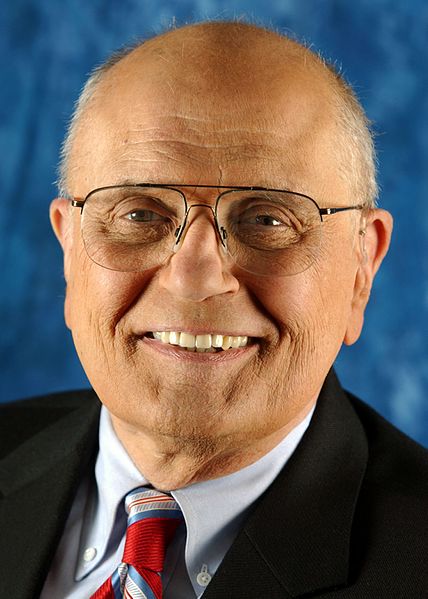The writer, a Los Angeles freelancer, is a former Detroit News business reporter who blogs at Starkman Approved.
By Eric Starkman
Back in 1986, when Gannett and Knight-Ridder, then the respective owners of The Detroit News and Free Press, conspired to merge the business operations of the fiercely competitive newspapers, Michigan’s political and corporate leaders rallied to prevent what they correctly predicted would lead to the editorial decline of both publications. Local leadership opposition was so intense that when Knight-Ridder’s executives flew to Detroit from their San Jose headquarters they registered at hotels using aliases.

Late Congressman John Dingell (Photo: U.S. House)
The coalition of political and business leaders included UAW President Douglas Fraser, AFL-CIO president Sam Fishman, Michigan Reps. John Dingell and William Ford, and state Sen. John Kelly. Troy-based Kmart, then a proud Fortune 500 company, also opposed the merger, warning it would lead to significantly higher ad prices. The fiercest opponent was Mayor Coleman Young, who despised The News and the Freep but recognized that having two of the nation’s best newspapers vigorously competing in his own backyard was good for the city and its people.
The News and the Freep pulled off their merger, which precipitated the decline of both publications, as expected. Both are mere skeletons of their former selves; they don’t have the resources to cover Detroit and Michigan with the intensity for which they were once renowned. “Detroit” Free Press is a misleading name, given that the publication is designed and copy edited in Kentucky.
Southeastern Michigan has suffered greatly from the decline of its newspapers. Both publications lost the gravitas they once commanded, which, in turn, allowed major companies to do deals harmful to Michigan with little public scrutiny or opposition.
Take banking, for instance. Detroit was once considered a financial center because of the thriving banks that were headquartered here, but most of the majors merged unopposed with out of state firms. NBD, the state’s biggest and, when it was controlled by the Fisher family was deeply committed to Detroit, is now part of New York-based Chase.
Comerica in 2007 gave Detroit a major FU relocating its headquarters to Dallas. Despite all of Comerica’s expansion to California, Florida, and other places, Michigan still accounts for nearly 30 percent Comerica’s revenues, more than any other state.
Comerica was a lousy corporate citizen even when it was based here; it moved most of its Michigan operations to Auburn Hills in the mid-80s and converted the vault in its downtown headquarters to a climate-controlled cellar to store wines the CEO acquired on his trips to Europe.
Nationally Prominent

Beaumont CEO John Fox (Photo: Beaumont Health)
Health care is one area where Michigan still has nationally respected companies. University of Michigan's University Hospital in Ann Arbor and Beaumont Health’s flagship Royal Oak campus easily rank among the top one percent of hospitals in the country. But John Fox, the accountant who took over as Beaumont’s CEO five years ago, wants to fold Michigan’s health care crown jewel into Advocate Aurora, a giant hospital chain headquartered in Illinois and Wisconsin whose hospitals don’t approximate in reputation anything close to Beaumont Royal Oak.
Beaumont hospitals have a total of 19 adult specialties, including 11 at the flagship Royal Oak facility, ranked among the top 50 in the country by U.S. News and World Report. Advocate Aurora has none.
Studies overwhelmingly show that hospital mergers lead to higher prices. California’s attorney general alleged in a lawsuit that Sutter Health, which through mergers became the dominate hospital company in Northern California, was charging as much as 30 percent more for procedures than hospitals in Southern California.
Sutter Health is a “not-for-profit,” as is Beaumont and Advocate Aurora, but they’re as driven by money as their for-profit counterparts, if not more so. An investigative report by Milwaukee’s local CBS station in February revealed that Aurora’s hospitals were exceptionally aggressive filing lawsuits against patients for unpaid bills, even for small amounts.
Michigan residents pay among the lowest U.S. hospital fees, according to a 2019 Rand study. More importantly, Beaumont’s patient fees in the study were the absolute lowest as a percentage of Medicare in the country, arguably making it one of the nation’s best hospitals at the lowest cost.
It’s highly unlikely that Advocate Aurora is looking to merge with Beaumont to gain expertise in lowering its prices. It's Beaumont’s doctors and nurses that can teach Advocate Aurora how to operate a top one percent clinical organization at bottom barrel prices. That’s why Michigan benefits keeping Beaumont independent and locally managed.

Richard Whitmer, father of Gov. Gretchen Whitmer
Blue Cross Blue Shield of Michigan, the state’s dominant private insurer, deserves some credit for Michigan’s comparatively low hospital prices, as does Richard Whitmer, who headed the company from 1988 to 2006 and rescued it from oblivion.
Yes, Richard Whitmer is related to Michigan’s governor. He’s her father.
Gov. Gretchen Whitmer has additional DNA to instinctively oppose Beaumont’s merger with Advocate Aurora. Her mother Sherry served as an assistant attorney general to Frank Kelley, Michigan’s legendary AG who held that office for 37 years and surrounded himself with legal heavyweights like Deputy Attorney General Leon Cohan.
Staunch Consumer Advocate

Former Attorney General Frank Kelley
Kelley was known and respected nationally for his consumer advocacy, having been the first AG in the country to establish a consumer protection division. Kelley ate utility and insurance companies for lunch, routinely beating them up on their proposed price increases.
Beaumont’s merger with Advocate Aurora requires approval by Michigan’s attorney general. Perhaps I’m romanticizing, but I imagine that if Kelley reviewed the Advocate Aurora deal, he’d not only summarily reject it, but also order an investigation into the nearly $6 million paid to Fox in 2017 and 2018. (It’s not yet publicly known what Fox was paid in 2019.)
Kelley was also respected for protecting Michigan’s charitable assets. The consensus of the dozens of Beaumont doctors and nurses I’ve interacted with these past few weeks is that Fox and his COO sidekick Carolyn Wilson have harmed patient care at the expense of profits.

John Lewis
Executives at GM and Ford, as well as unions representing their workers, also have been publicly silent on Beaumont’s proposed merger plans, despite health care costs being a major source of contention during contract negotiations. The automakers and their unions have vested interests opposing the merger because it will likely result in higher health care costs. In fact, every company and every resident in Southeast Michigan should be alarmed by Fox’s plans to destroy Beaumont.
It’s sad that Michigan no longer appears to have the committed political and business leaders with the backbone to step up to the plate and protect valuable local institutions. It’s especially disheartening that Beaumont’s board chairman is John Lewis, who spent 36 years at Comerica and played an instrumental role in the bank’s expansion out of state.
Reach Eric Starkman at eric@starkmanapproved.com Beaumont employees and vendors are encouraged to reach out, with confidentiality assured.
Columns by same writrer:
- Beaumont Health Terminates More Than 70 Heroic Covid Docs
- Wake Up, Michigan! John Fox Wants to Diminish Beaumont Health
- Public Hearings Must Be Held on Beaumont Selling Out Michigan
- Beaumont Speaks Truth to Metro Detroit and its Workers: It’s All About the Benjamins, Baby
- Beaumont’s FU to Metro Detroit and its Covid-19 Workers










